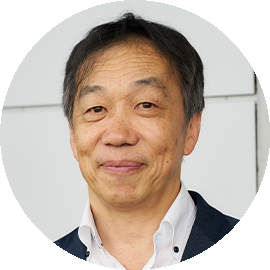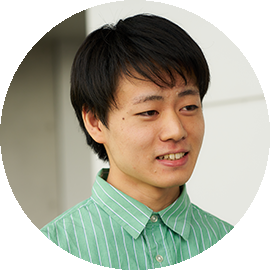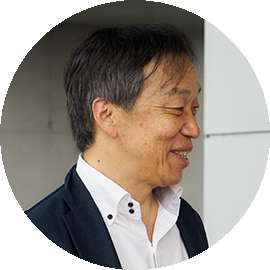Hello, I am one of the members of Honda Stories team. Normally, I work behind the scenes to deliver interesting Honda Stories to our readers, but I always had a desire to report on Honda initiatives myself so that our readers can feel more familiar or relate to such initiatives. So, I participated in a lecture session held at the University of Tokyo on June 24, 2023. In this edition of Honda Stories, I am introducing to you the contents shared at the lecture session.

Mr. Shun Kawabe, the Honda R&D Fellow who leads the development of Honda eVTOL, talked about the current status and future challenges in Honda’s eVTOL development in his lecture speech titled “Next Generation Mobility in the Skies: Trends and Challenges Toward Realization.” The audience, mostly alumni of the University’s Department of Aeronautics and Astronautics and others involved in these areas of study, listened attentively to Mr. Kawabe’s speech.
This lecture session was hosted by an association for alumni and faculty members of both graduate and undergraduate programs of the Department of Aeronautics and Astronautics of the University of Tokyo, which is one of the most prestigious institutions in the field of space and aviation in Japan, producing a number of experts and leaders in the field, including astronauts Soichi Noguchi, Naoko Yamazaki and Takuya Onishi. Let’s take a look at what Mr. Kawabe, who is one of the alumni, discussed at this gathering of experts who play key roles at the forefront of the aeronautics and astronautics studies.

Fellow, New Mobility,
Innovative Research Excellence,
Honda R&D Co., Ltd.
View More
Close
Shun Kawabe
Read More
Honda’s vision for the mobility society in the skies
Why is Honda Developing eVTOL?

There still may be many people who are not familiar with the term “eVTOL,” but it means electric vertical take-off and landing aircraft, and some people call it a “flying car” in recent years. However, in his lecture, Mr. Kawabe said, “I don’t want to call eVTOL a flying car.” The reason for that was the key subject of his lecture, but since Mr. Kawabe will talk about it at the end of the story, we will not get into it, yet.
Here is the summary of what Mr. Kawabe discussed in his speech:
Why is Honda developing eVTOL? In order to serve people worldwide with the “joy of expanding their life’s potential,” Honda wants to take on challenges in new areas which will enable us to expand the existing range of mobility products and services. The development of Honda eVTOL is one of the concrete ways to prepare for such a future.
What Honda is striving to achieve in the future is the establishment of a new “mobility ecosystem” with eVTOL at its core. In other words, Honda will not only develop hardware such as the airframe and power unit of eVTOL, but also design all necessary elements for the real-world utilization of eVTOL as a single system, including ground-based infrastructure and operating systems as well as various services and support, and develop such a system in collaboration with a broad range of stakeholders.
How is Honda eVTOL different?

Let's take a look at key features of Honda eVTOL. Safety has been the first and foremost priority in designing Honda eVTOL, which is equipped with eight rotors for vertical take-off and landing and two rotors for propulsion. This design was developed with an assumption to secure a high degree of redundancy by distributing functions. While striving to create a safe, quiet and clean eVTOL, the development team had to give particularly careful consideration to how to secure necessary range.
To this end, the team adopted a gas turbine hybrid power unit (GT-Hybrid) which combines a gas turbine generator and battery. Compared to the battery, the GT-Hybrid features significantly high energy density and thus realizes the maximum range of 400km (approximately 250 miles). Honda is striving to create a mobility product that is suited for travel to places that are too far by car, but not far enough to require flying by airplane.
 “There are many things that only Honda can do because it has been amassing technologies in a wide range of technological areas including HondaJet, F1, hybrid vehicles and safety and driver assistive technologies,” said Kawabe.
“There are many things that only Honda can do because it has been amassing technologies in a wide range of technological areas including HondaJet, F1, hybrid vehicles and safety and driver assistive technologies,” said Kawabe.
However, there are many challenges Honda still must overcome in order to create an actual eVTOL aircraft that fulfills all desired performance. To create an eVTOL which will fulfill requirements in all areas including flight control, aerodynamic performance, environmental performance, automated operation, thermal management, weight and cost, a number of development phases are required, including wind tunnel tests, various other tests, numerical analysis and software development. It seems that overcoming the challenges by devising propulsion systems and applying electrification technologies will be the major deciding factors in the development.
Offering people the “joy of expanding their life’s potential” with our mobility in the skies
Obtaining aircraft certification is an inescapable part of the development process. Honda is fully committed to give the utmost consideration to safety and develop an eVTOL which will offer great convenience for customers, which will ensure a smooth and successful certification.
It still will take a long time to establish a new “mobility ecosystem.” While we are working on it, both technologies and conditions in our society will definitely change. Therefore, it will be important to design and create a flexible system that can address such changes. Also, it will be important not to pursue this ecosystem development in a closed environment within individual companies and countries, but make it open by being conscious about collaborating with a broad range of stakeholders all around the world.
Mr. Kawabe concluded his lecture speech with the following words:
“The current situation where people demand new mobility systems that take advantage of the skies is an opportunity for Japan. I believe that public, private and academic sectors should work together to build such systems, and that we need to take this seriously as an engineering endeavor. That is why we should not use the term ‘flying car.’ The term has a dream-inspiring connotation, but what we are striving for is not a dream, but a real thing.”
Interview: What did current University of Tokyo student think?
After the speech, multiple questions were asked, which turned into a lively exchange of ideas before the session successfully concluded. After the session, I asked some students in the audience what they thought and how Mr. Kawabe’s message was conveyed.
 Mr. Ayuto Manabe is a second-year doctoral student in the Department of Aeronautics and Astronautics. He is currently working on research in the areas of rocket acceleration engines and new acceleration methods for satellites.
Mr. Ayuto Manabe is a second-year doctoral student in the Department of Aeronautics and Astronautics. He is currently working on research in the areas of rocket acceleration engines and new acceleration methods for satellites.

I found it very interesting, as it has many similarities to my own research subjects. His approach to eVTOL development sounded very solid and therefore convincing. eVTOL may not be a well known area of study among the students in our department, but I am sure there are many people who will be interested in it.

- What are your expectations for Honda in the future?

Honda is one of the most well-known companies among the students in our department. The concept of making changes to society through mobility is interesting, and I hope that Honda will continue to take on various business challenges in the field of aerospace.

- Thank you for your time!
And lastly, I had an opportunity to ask a quick question directly to Mr. Kawabe after his lecture session.
 It was the first time for me to talk to him, but Mr. Kawabe was very friendly and easy to talk to.
It was the first time for me to talk to him, but Mr. Kawabe was very friendly and easy to talk to.

- Thank you for your lecture. How did you feel about speaking at your alma mater?

I might have packed a little too much content into my speech, but I wanted to convey the message that I want Japan to show its presence in the new movement of AAM (Advanced Air Mobility, the next-generation mobility in the skies). Also, we would like to create well-crafted eVTOL and the new world mobility with such eVTOL at its core over the next 10 to 20 years. In order to create such a trend in Japan as a whole, I am glad that I was able to convey my thoughts to the people involved in the Department of Aeronautics and Astronautics of the University of Tokyo. I would like to continue doing more of that in the future.

- Thank you, Mr. Kawabe!
This will conclude my event report on Honda’s eVTOL initiatives. I hope that you will continue looking forward to the future of Honda eVTOL. The Honda Stories team is planning to publish follow-up stories which will include more details and interview of Mr. Kawabe. Please look forward to them!
Original article issued on June 30, 2023

![[Event Report] Honda eVTOL development leader speaks at the University of Tokyo: The mobility in the skies envisioned by Honda](/content/dam/site/global-en/stories/cq_img/071/social.jpg)





- Please tell us what you thought of the lecture session.